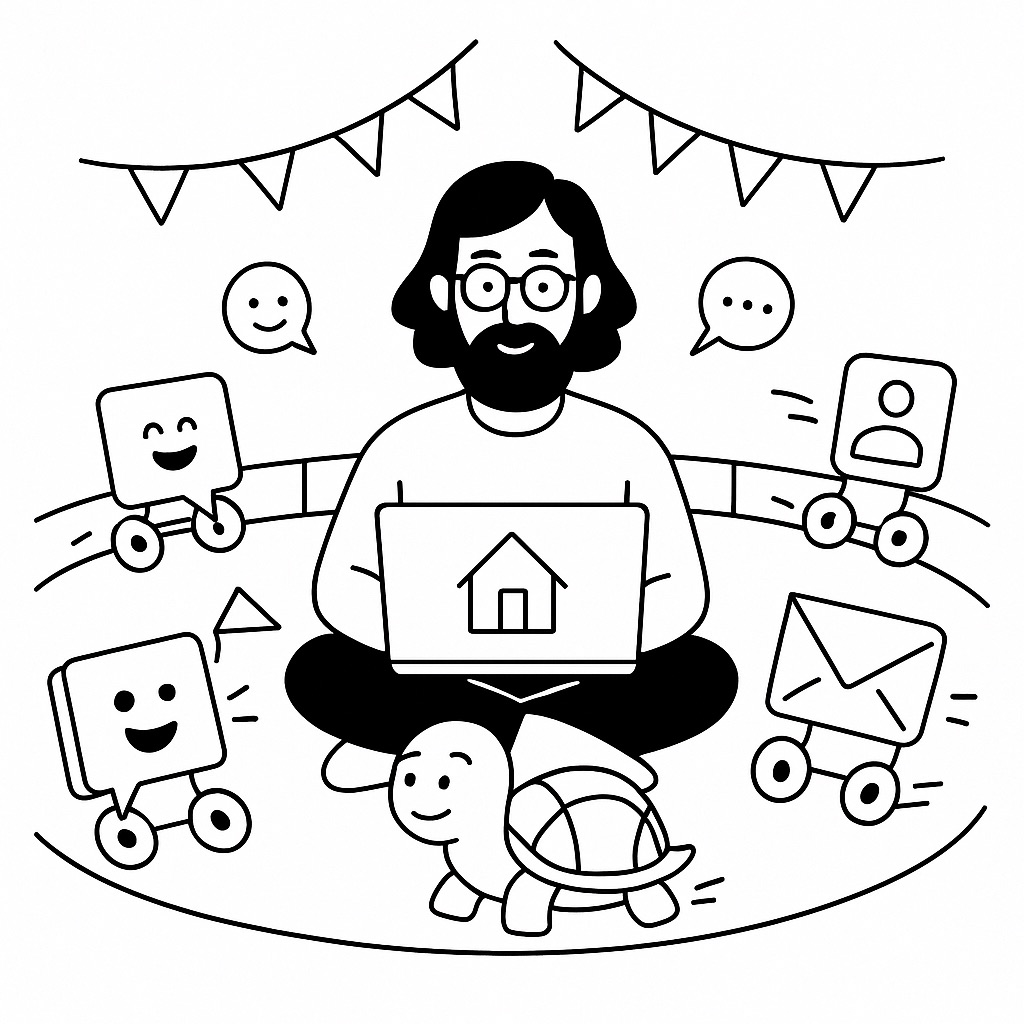
Let me guess: you’re scrolling through LinkedIn, watching another “personal branding expert” tell you that all you need is a strong social media presence. Meanwhile, your cousin’s cousin just launched their 47th newsletter on Substack, and your feed is flooded with “build your audience on platform X” advice.
So why am I here, in 2025, telling you that you still need a personal website?
Because I’m either completely wrong, or everyone else is missing the point. Let me make my case.
The Platform Roulette Problem
Remember when everyone said “build your audience on Facebook”? Then it was Instagram. Then TikTok. Now it’s whatever platform launched last week that promises to “revolutionize professional networking.”
Here’s what nobody talks about: platforms come and go, but your domain stays forever.
I’ve watched brilliant professionals lose thousands of followers overnight because Algorithm God decided their content wasn’t “engaging enough.” I’ve seen entire businesses crumble when their primary platform changed its monetization rules. And don’t get me started on what happened when certain platforms got banned in entire countries.
Your personal website? It’s the one piece of digital real estate that you actually own.
Social Media is Rented Land
Think of social media platforms as renting an apartment in someone else’s building. Sure, you can decorate it, invite people over, and make it feel like home. But at the end of the day, the landlord can change the rules, raise the rent, or even kick you out.
Your website is buying a house. It’s yours. You control the mortgage, the renovations, and who gets to visit.
The Professional Credibility Factor
Here’s a fun experiment: Google any professional you respect. Notice something? The first result is probably their personal website, not their Instagram account.
When someone wants to hire you, work with you, or take you seriously, they don’t scroll through your TikToks (well, maybe they do, but they won’t admit it). They look for your website. It’s digital credibility in its purest form.
A personal website says: “I’m serious enough about my career to invest in my own corner of the internet.” A bio link in your Instagram says: “I’m here for the gram and maybe some business, idk.”
The SEO Advantage Nobody Talks About
While you’re fighting for visibility in crowded social feeds, your website is quietly working 24/7 to get found on Google.
Someone searches “marketing strategist Belarus”? Your optimized website appears. Someone looks up “podcast production expert”? There you are. Try getting that consistent visibility from your Twitter account.
Plus, search engines love websites that demonstrate expertise, authority, and trustworthiness. Your collection of thoughtful blog posts beats random social media updates every time.
Control Your Narrative (Finally)
On social platforms, you’re performing for the algorithm. You write what gets engagement, not necessarily what showcases your best work. You’re constrained by character limits, trending hashtags, and whatever format is popular this week.
On your website, you tell your story your way. Long-form articles, detailed case studies, your actual portfolio—not just the highlights that fit into a square image.
The Networking Multiplier Effect
Here’s where it gets interesting: a personal website doesn’t replace social media—it amplifies it.
Your LinkedIn post gets attention? Great, drive them to your website for the full story. Your Substack newsletter is growing? Perfect, your website is where subscribers can explore your complete body of work. Your TikTok went viral? Awesome, now you have a professional place to send all those new followers.
Your website becomes the hub that connects all your other efforts.
But What About [Insert Latest Platform Here]?
“But Denis,” you might say, “what about BeReal for professionals? What about the new LinkedIn competitor? What about virtual reality networking?”
My answer: use them all! But let your website be your home base.
Trends will change. Platforms will rise and fall. But professionals who consistently invest in their own digital presence—on their own terms, on their own domain—will always have an advantage.
The 2025 Reality Check
In 2025, having a personal website isn’t revolutionary. It’s foundational.
It’s not about being anti-social media or dismissing new platforms. It’s about being smart enough to build your career on something you actually control.
Your future self will thank you when the next platform pivot happens and you’re not scrambling to rebuild your entire online presence from scratch.
So, What Now?
Stop overthinking it. Register your domain (yes, your actual name if it’s available). Create a simple site with your story, your work, and a way to contact you. You don’t need a $10,000 custom design—you need a professional home on the internet.
Then go back to posting on TikTok, writing on Substack, and networking on LinkedIn. But now you’ll be driving traffic to something you actually own.
Because in a world of rented digital spaces, ownership is the ultimate flex.
What do you think? Am I fighting yesterday’s battle, or is there something to this “own your corner of the internet” philosophy? Share this post and let’s debate it—I promise I won’t judge you for sharing it on someone else’s platform. 😉
Ready to build your own digital home base? Check out my free marketing tools or get in touch if you need help crafting your online presence.
